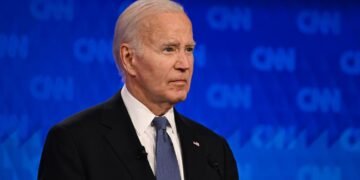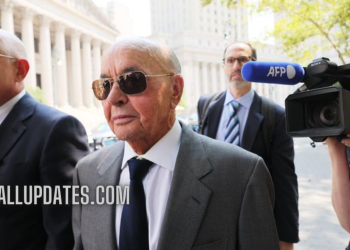Rain Newton-Smith is taking over as director general of the CBI as the lobbying organisation contends for survival amidst sexual misconduct allegations.
Wednesday will mark her return to the CBI, where she previously held the position of chief economist.
The business lobbying giant has acknowledged that it did not terminate employees who sexually harassed female employees.
Brian McBride, the president of the CBI, has pledged to implement the recommendations of a law firm’s investigation.
However, some have questioned whether Ms. Newton-Smith, a former employee and member of the executive board, is the best candidate to lead the organisation through the scandal.
She worked for the CBI for close to nine years before departing in March to join Barclays.
Since the Guardian published allegations of workplace misconduct, harassment, and sexual assault, including two allegations of rape, the CBI has been in a state of crisis.
Commenting on Ms. Newton-Smith, Baroness Morrissey, a City fund manager who chairs investment firm AJ Bell, told the BBC, “I’m sure she’s wonderful in many ways, but it doesn’t quite demonstrate that you’re embracing a new approach to all of this.”
Since additional allegations have surfaced against the CBI, dozens of companies have either terminated their membership or ceased all interactions with the organisation.
John Lewis, BMW, Virgin Media O2, insurers Aviva, Zurich and Phoenix Group, banking firm Natwest, credit card company Mastercard; B&Q owner Kingfisher, media firm ITV, accounting behemoth Deloitte, and FTSE 100 software firm Sage are among the companies that have suspended their membership.
Meanwhile, the City of London Corporation announced on Wednesday evening that it had terminated its membership with the CBI.
Ann Francke, chief executive officer of the Chartered Management Institute, stated, “If you look at these types of reputation implosions, which are very tragic for everyone and weigh heavily on everyone, the typical approach is to obtain an external perspective to address the very ingrained issues that require change.”
The CBI claims to represent 190,000 companies that employ approximately seven million individuals.
On behalf of its constituents, lobbying the government is one of its primary responsibilities.
Earlier this month, however, the government announced that it had suspended its relationship with the CBI, and this week, Chancellor Jeremy Hunt stated, “There’s no point in engaging with the CBI when their own members have deserted them in droves.”
What exactly is CBI?
According to its former president, Paul Drechsler, the Confederation of British Industry (CBI) was instrumental in safeguarding millions of jobs during the Covid pandemic by assisting with the rapid implementation of the furlough scheme.
The CBI actively opposed Brexit. As soon as the United Kingdom voted to leave the European Union, it began lobbying for a trade and cooperation agreement.
Another function of the CBI is to promote and facilitate the dissemination of best practises among its members.
It was founded in 1965 and currently employs roughly 300 employees. The majority of its director generals have been men, with the exception of Dame Carolyn Fairbairn, who commanded the organisation from 2015 to 2020, and Ms. Newton-Smith.
Presentation grey area
Wayne Wright, managing partner of business advisory firm Wsq Solutions, stated that the new CBI leader had “four weeks” to “at least put a marker down” on how the organisation would not only go about implementing and measuring the change, but also how it would go about changing.
Incorporating a new corporate culture typically takes a couple of years, he said, but the CBI “does not have that luxury.”
Ms. Newton-Smith consented to return to the CBI following the termination of her predecessor, Tony Danker, for separate allegations of workplace misconduct.
David Samuels, an employment partner at the law firm Lewis Silkin, stated, “She faces a formidable challenge, as the CBI needs to implement a significant amount of cultural change and regain the confidence of the public and their members.”
He added, “She is a former employee, which could be used against her, but she will be familiar with the organisation, so she may be able to grasp the changes and implement them more quickly.”
Mr. McBride stated that Ms. Newton-Smith “has demonstrated great courage by accepting this position during a very challenging time.”
He stated, “We asked Rain to return to the CBI not only due to her extensive economic and policy expertise, but also because the CBI employees hold her in the highest regard.”
In response to the allegations, the CBI has suspended all membership and policy activities until June. The organisation will then convene an extraordinary general meeting where it will present proposals to its members “for them to decide on the organization’s future role and purpose.”














































